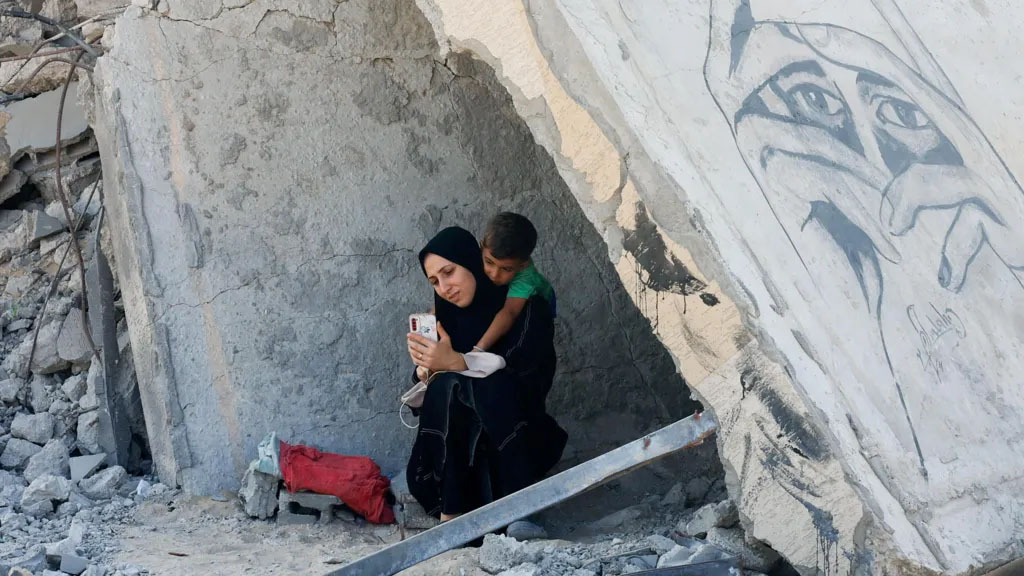International
Bowen: ‘US threat to cut Israel military aid sign of anger’

Bowen: ‘US threat to cut Israel military aid sign of anger’
The first aid in two weeks has gone into northern Gaza following a letter from the US that gave Israel 30 days to boost humanitarian access, or risk having some military assistance cut off.
The letter is the Biden administration’s most detailed public criticism yet of the way Israel has blocked humanitarian aid to Gaza. It was signed by Secretary of State Antony Blinken and Defence Secretary Lloyd Austin and was supposed to be private, until it was leaked to Israeli journalists.
It is a blueprint for an entirely different approach by Israel to the aid operation in Gaza – expediting it, rather than imposing restrictions. The letter is a line-by-line examination of Israel’s obstruction of aid deliveries – and the way its forcible relocation of civilians has exposed 1.7 million Palestinians to serious risk of disease.
It even challenges Israel’s long-standing attack on UNRWA, the UN agency that looks after Palestinian refugees.
The US is “very concerned” about proposed new laws that would “remove certain privileges and immunities”. An Israeli government minister wants to confiscate UNRWA’s headquarters in occupied East Jerusalem to use the land for a Jewish settlement.
The US says it acknowledges Israeli concerns about UNRWA, but that restrictions on it would “devastate” the humanitarian effort in Gaza and the education and welfare of tens of thousands of Palestinians in East Jerusalem and the occupied West Bank.
The letter cannot have made easy reading for its two recipients, Yoav Gallant, Israel’s defence minister, and Ron Dermer, its minister of strategic affairs, who is one of Prime Minister Benjamin Netanyahu’s closest advisers.
That is not just because the letter details the “US government’s deep concern over the deteriorating humanitarian situation in Gaza”. It also contains a reminder, that is also a threat, that US laws restrict arms transfers to countries that block the distribution of American aid.
Gallant set the tone of Israel’s approach to humanitarian aid flows to Gaza two days after the Hamas attacks of 7 October 2023. He announced a “complete siege” of the Gaza Strip. No fuel or food would be allowed in, he said. “Everything is closed… We are fighting human animals and we are acting accordingly.”
Pressure, not least by the Americans, forced Israel to moderate Gallant’s plan, but the aid coming in has never been consistent or adequate. In recent months, though, restrictions have been tightened, which seems to have prompted the letter. It is a sign of the exasperation and anger inside the Biden administration that Israel has not kept its promises to keep aid flowing into Gaza.
The European Union’s chief diplomat and leading human rights groups have already accused Israel of using starvation as a weapon of war. In May, Karim Khan, the chief prosecutor of the International Criminal Court, accused Prime Minister Netanyahu and Yoav Gallant of starvation of civilians as part of his application for the court to issue arrest warrants for war crimes and crimes against humanity. Both men rejected the allegation.
When Netanyahu spoke at the UN General Assembly in New York on 27 September, he dismissed accusations that Israel was starving Gazans as “an absurdity”. He presented a version of Israel’s role in the Gaza aid operation that is diametrically opposed to the one described in Blinken and Austin’s letter.
READ ALSO:
- EFCC an unlawful organisation, says Agbakoba, writes National Assembly
- Yoruba Nation agitator dies in Ibadan custody
- US bombers target Houthi weapon sites in Yemen
For Netanyahu, the accusations were another sign of antisemitism at the UN and its institutions.
Israel, he said, was beset by “lies and slanders”.
“Good is portrayed as evil, and evil is portrayed as good.”
“We help bring in 700,000 tonnes of food into Gaza. That’s more than 3,000 calories a day for every man, woman, and child in Gaza.”
The hard facts in the US letter are a stark contrast to his emotive rhetoric. Some of them focus on restrictions Israel imposed in September, while Netanyahu made his claims in New York.
- “The amount of assistance entering Gaza in September was the lowest of any month during the past year” – in other words, since before Hamas’s 7 October attacks last year
- The US is particularly concerned by “recent actions by the Israeli government – including halting commercial imports, denying or impeding nearly 90% of humanitarian movements between northern and southern Gaza in September”
The Americans also criticise the way Israel slows the delivery of aid by imposing onerous rules, and make a number of specific demands:
- They want the removal of the restrictions on the use of closed lorries and containers, and to increase the number of vetted drivers to 400. UN agencies say that a shortage of drivers and lorries has made getting aid into Gaza much harder
- Israel must tighten and speed up security and customs checks. Aid organisations say cumbersome rules are used to slow deliveries down
- The Americans want aid to be funnelled through the port of Ashdod in an “expedited” route to the Gaza Strip. Ashdod is a modern Israeli container port a short drive north of Gaza. After Israel refused to let it be used, the US spent an estimated $230m (£174m) on a floating pier for aid deliveries into Gaza that broke up in bad weather before it could make a difference
- Israel should also remove restrictions on deliveries from Jordan
Israel argues that Hamas steals aid and sells it at inflated prices. The Americans do not directly engage with that, except in a single sentence that acknowledges there has been “increased lawlessness and looting”. Front and centre in the letter is Israel’s squeeze on Gaza.
Their criticism extends way beyond the mechanics of getting aid into Gaza. It demands an end to the isolation of northern Gaza, where ultra-nationalists in Netanyahu’s cabinet want to replace Palestinians with Jewish settlers.
Concern about northern Gaza has increased since Israel started its current offensive there.
READ ALSO:
- Tinubu, Shettima’s absence won’t create vacuum in government – Presidency
- Submit 2025 Budget proposal without delay, Reps tell Tinubu
- One Direction star Liam Payne falls from balcony fall, dies
The army’s actions have resembled parts of a plan put forward by a group of retired officers, led by Giora Eiland, a major-general who used to be Israel’s national security adviser. Eiland says he wanted a deal to get the hostages back and end the war early on. But as that didn’t happen, he believes more radical action is necessary.
Israel has already separated northern Gaza from the south with a corridor along Wadi Gaza that bisects the territory. Eiland told me that his plan was to open evacuation routes for a week to 10 days so that as many of the 400,000 or so civilians left in the north leave. Then the territory would be sealed, all aid supplies cut, and everyone left inside would be considered a legitimate military target.
A version of the plan appeared to be in place at Jabalia camp in the north, after it was sealed off by Israeli troops, tanks and drones.
The Blinken-Austin letter insists that there can be “no Israeli government policy of forced evacuation of civilians from northern to southern Gaza”. Aid agencies should have “continuous access to northern Gaza” and should be able to enter it direct from Israel rather than taking the hazardous and often deadly route from the south. Orders to evacuate must be cancelled “when there is no operational need”.
Israel has forced 1.7 million civilians, many of whom fled northern Gaza, into a narrow strip of land along the coast between al-Mawasi and the town of Deir al-Balah, where the letter says “extreme overcrowding exposed the civilians to a high risk of contracting serious diseases”.
The Americans want the pressure to be eased, for civilians to be allowed to move inland before the winter. BBC Verify has established that Israel has also bombed what it says are Hamas targets in an area it calls a humanitarian zone.
The letter had immediate results. For the first time since the beginning of October, Israel has allowed in convoys of lorries carrying aid, though not yet on the scale requested by the US. Whether the letter can end the humanitarian catastrophe in Gaza, particularly in the absence of ceasefire, is another matter.
Israel has been given 30 days to remedy matters. The US presidential election happens within that time frame. Before polling day, the US would not restrict weapons shipments to Israel, especially given the fact that the Israelis are on the brink, potentially, of a much wider war with Iran.
READ ALSO:
- Delta LG boss, PDP chairman exchange slaps during town hall meeting
- Rivers: Pro-Fubara lawmakers plan penalties against Amaewhule-led assembly
- Imo: Scores dead in gun battle between soldiers, bandits
If Vice-President Kamala Harris wins, the Biden administration will be able to keep up the pressure on Israel until the inauguration in January.
It is likely to be a different story if former President Donald Trump gets his second term. Based on Trump’s previous four years in office, Netanyahu is likely to feel he has much more freedom to do what he wants as he runs down the clock on Joe Biden’s time in the White House.
Biden has been widely criticised, in his own Democratic Party and further afield, for not using the leverage that should come with America’s position as Israel’s most vital ally. Without US military and diplomatic support Israel would struggle to fight its wars. The letter looks like a serious attempt to impose pressure. In the last year of war, Netanyahu has often ignored US wishes.
A turning point came at the UN General Assembly in late September, when the US, UK and other allies of Israel believed they had talked Israel into accepting a 21-day truce in Lebanon to make time for diplomacy.
Instead, Netanyahu’s speech doubled down, rejecting a truce and escalating the regional war. From his hotel in New York, he ordered the assassination of the leader of Hezbollah, Hassan Nasrallah. Some senior Western officials complain that the Biden administration has been “played” by Netanyahu.
The letter is a belated attempt to redress the balance. Biden has been convinced he can best influence Israel by offering unconditional support. He advised Israel after 7 October not to be blinded by rage, as he said America was after the al-Qaeda’s 9/11 attacks.
But his wishes have often been ignored by Netanyahu. Whether or not Israel listens to America’s demands on Gaza, as Biden enters his last lap as president, it is clear that his attempt to stop the spread of the Gaza war across the Middle East has failed.
And as for the letter, it will be too little, too late for all those civilians in Gaza who have suffered, and for those who have died, as the result of months of restrictions in humanitarian aid imposed by Israel.
Bowen: ‘US threat to cut Israel military aid sign of anger’
BBC
International
Canada denies 13,000 Nigerians refugee status

Canada denies 13,000 Nigerians refugee status
Over 13,000 Nigerians who applied for refugee protection in Canada from January 2013 to December 2024 were rejected.
According to data from the Refugee Protection Division (RPD) of the Immigration and Refugee Board of Canada, this figure includes 811 Nigerians whose applications were turned down in 2024.
The board placed Nigeria among the top five countries with the most rejected claims.
Mexico tops the list with 2,954 rejections, followed by India and Haiti, which have 1,688 and 982 rejected claims, respectively.
Colombia is in fourth place with 723 rejected claims, while Nigeria is in fifth place with 13,171 rejections.
In Canada, asylum seekers get refugee protection if the RPD satisfactorily confirms that their claims meet the United Nations definition of a Convention refugee.
In its definition of the Status of Refugee, the 1951 UN Convention states refugees are persons who have a substantiated fear of persecution because of their race, nationality, religion, political ideology or membership in a particular social group, which can include sexual orientation, gender identity, being a woman and persons living with HIV/AIDS.
READ ALSO:
- Lagos Govt to redesign Oshodi motor park for rail integration
- Nurse punished in UK for addressing convicted transgender paedophile as ‘Mr’
- Ex-LG chair challenges El-Rufai’s claims on council funds
However, in Canada, asylum seekers are expected to show evidence that they are in danger of torture, risk to their life or risk of cruel and unusual treatment or punishment if they return to their country of nationality.
According to the Refugee Board’s application guideline, if an applicant’s “claim is eligible, it is sent to the RPD to start the claim for refugee protection process.”
The breakdown of the rejections showed that 127 Nigerian claims were rejected in 2013, 241 in 2014 and 248 in 2015.
Canada denies 13,000 Nigerians refugee status
International
Nurse punished in UK for addressing convicted transgender paedophile as ‘Mr’

Nurse punished in UK for addressing convicted transgender paedophile as ‘Mr’
A senior nurse in the UK is battling to save her career after facing disciplinary action for refusing to refer to a convicted child sex offender as a woman.
Jennifer Melle, 40, from Croydon, was working at Epsom and St Helier University Hospital Trust when she declined to use female pronouns for a paedophile known as ‘Mr X,’ per report from the London Standard.
The offender, currently serving time in a high-security male prison, was jailed for grooming boys online while posing as a teenage girl.
Following her refusal, Melle claims she was subjected to racial abuse and physical threats.
She was, reportedly, then issued a final written warning and referred to the Nursing and Midwifery Council (NMC) for allegedly breaching professional standards.
READ ALSO:
- Ex-LG chair challenges El-Rufai’s claims on council funds
- Some ladies in movie industry ready to sleep their way to fame — Jide Kosoko
- Gunmen abduct Catholic priest in Anambra
NHS lawyers argued that Melle’s Christian belief—that people are born male or female—was “not worthy of respect in a democratic society.”
An internal investigation found she had violated the NMC Code of Conduct by failing to respect the patient’s “preferred identity” and uphold the Trust’s core value of “Respect.”
As a result, Melle has been moved to another ward, which she says is a demotion, and has had her name removed from internal hospital systems, preventing her from applying for additional shifts.
Now, with the backing of the Christian Legal Centre, she has launched legal action against the Trust, alleging harassment, discrimination, and breaches of her human rights.
The case comes amid growing controversy over gender policies in public institutions.
A recent report, the Sullivan Review, revealed that UK police forces have been allowing criminals to self-identify their gender on official records, sparking nationwide debate.
Nurse punished in UK for addressing convicted transgender paedophile as ‘Mr’
International
Gaza: Iran begins talks with S’Arabia, Egypt as Israel renews attacks

Gaza: Iran begins talks with S’Arabia, Egypt as Israel renews attacks
Iran’s Foreign Minister Seyed Abbas Araghchi on Saturday exchanged views with his Saudi Arabian and Egyptian counterparts on Israel’s renewed attacks on Gaza.
In a phone conversation with Saudi Foreign Minister Faisal bin Farhan Al Saud, Araghchi strongly condemned Israel’s attacks in Gaza, and urged other countries in the region to take collective action, said the Iranian Foreign Ministry in a statement.
For his part, Faisal reaffirmed Saudi Arabia’s condemnation of Israeli aggressions and emphasized regional coordination to prevent further escalation.
READ ALSO:
- Disregard court order against Rivers Administrator, says Fubara’s aide
- Three killed,15 injured in U.S. park shooting
- Why governors’ forum is silent on Rivers emergency, by DG
In a separate phone call with Egyptian Foreign Minister Badr Abdelatty, Araghchi condemned Israel’s renewed attacks on Gaza as well as obstruction of humanitarian aid delivery to the Palestinian coastal enclave “in flagrant violation” of the ceasefire agreement with Hamas.
The Egyptian foreign minister underscored the need for consultations and diplomatic efforts to prevent further escalation.
Both Egyptian and Iranian ministers agreed to maintain consultations on regional developments.
Gaza: Iran begins talks with S’Arabia, Egypt as Israel renews attacks
Xinhua
-

 metro2 days ago
metro2 days ago‘We’re not hiring,’ NNPC denies viral recruitment adverts
-

 metro1 day ago
metro1 day agoNatasha: Court blocks recall attempt, stops INEC
-

 Sports1 day ago
Sports1 day agoOdegbami speaks on Osimhen breaking his 44-year goals record
-

 metro3 days ago
metro3 days agoMore trouble brews in Rivers as Ijaw congress considers self-determination option
-

 Entertainment1 day ago
Entertainment1 day agoI didn’t snatch Asake’s mother from her husband -Musibau Alani
-

 Sports2 days ago
Sports2 days ago2026 WCQ: Super Eagles move up to third place with 2-0 win in Rwanda
-

 metro1 day ago
metro1 day agoBoko Haram attacks military base in Adamawa
-

 Sports2 days ago
Sports2 days agoOsimhen breaks Odegbami’s Eagles goal record













